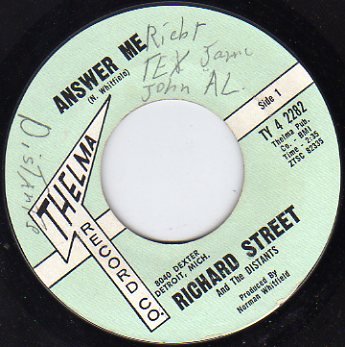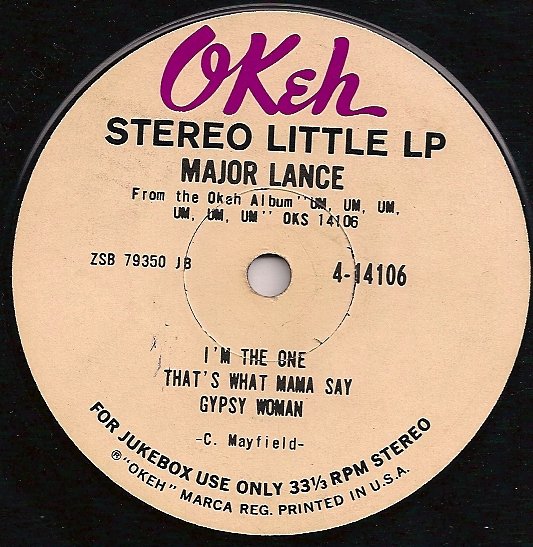Everything posted by Robbk
-
Records signed by the artist..
That single word doesn't look like "Darrell" or "Darrell Banks".
-
Magic Tones-fun To Be Young
You are correct. It was a different take. I heard it years ago. But, I, myself, don't have a soundfile of it.
-
Unknown Test Pressing.
Just as I guessed, early '80's, right during the heyday of Airwave. And a Detroit record, too!
-
Unknown Test Pressing.
Wow! That's really good! "(Girl) You Should Have Been A Man" ? It reminds me of some of the 1980s songs we heard while we were doing our thing at Airwave Records.
-
Unknown Test Pressing.
I don't use Facebook. Any chance you could upload at least a snippet of it onto this thread as an MP3?
-
Company record sleeves
Argo was a Chess subsidiary. While Argo existed, there were no Chess company sleeves. They started at just about the time Chess changed the name of its Argo subsidiary's company name to "Cadet Records". The first Chess sleeves were blue and white, and listed Chess, Checker and Cadet Records. AFO Records were sold in Dover Records sleeves when they were distributed by Dover Records. They were sold in plain white or brown sleeves while distributed by Sue Records. AGP Records were distributed by Bell Records, so they were sold in Amy-Mala Bell distribution sleeves (e.g. "Distributed by The Amy-Mala Bell Group"). Audio Arts was also distributed by The Amy-Mala Bell Group, and so was sold in those covers. When it was NOT distributed by Bell, it was sold in plain brown sleeves. Arctic Records was distributed by Jamie-Guyden Distributors, so, they were sold in Jamie/Guyden sleeves. Action (UK) had it's own company covers. Alon was sold mostly in plain brown or plain white sleeves. Alithia was mostly sold in plain white sleeves, but, for a short time, I believe they were distributed by Spring Records, and sold in Spring Records sleeves.
-
Records signed by the artist..
I should get Spyder to sign mine, and maybe Dennis, too! By the way, Dennis Coffey just made The R&B Hall of Fame!
-
Records signed by the artist..
Yes, Dee Edwards' birth name was Doris.
-
Records signed by the artist..
Rob Moss?
-
Records signed by the artist..
I've got Thelma no catalogue #, ZTSC 82335 and 82336, The Distants, "Answer Me"/"Save Me From This Misery", from June, 1962. It has the entire group's first name signatures, including Richard Street, James Weaver, Albert Harrell, Johnny, and Alphonso "Tex" Galloway.
-
Show us your great photos (2017)
Nice foto's of birds flying. We have several different kinds of marshbirds where I live (in Holland, Denmark, Bavaria and Manitoba) including storks, cranes, loons, herons, wild geese, coots and mallards. I see lots of scenes that would make great shots. In all my 71 years, I'd never owned a camera despite traveling all over The 3rd World working for The United Nations for 20 years, and working for Disney in 4 European countries since then. I finally got a camera (of sorts) a few years ago, when my new desktop and laptop computers had them included. And, a couple of years ago, I was forced to get my first mobile telefoons, which have a camera function. So, now I have a "portable camera". But, I don't really know how to use it, and doubt it would be good for outdoor scenes (probably limited "screen width". I've only taken about 10 snapshots in my life, with other people's cameras (mostly Oriental tourists asking me to take their pictures in front of some tourist attraction).
-
The Vals
I don't know the relative numbers existing today in The NS market, but back in the mid '60s, when the record was out, I saw10 stockers for every white DJ.
-
DOROTHY STEWART & THE JULETTES- GOT YOUR LOVE IN MY HEART
Both production sound very "southern", and nothing like the recordings I've heard from Saginaw, Michigan and upstate Michigan. Saginaw may be an Algonkian word that still survives among some Native American tribes in Tennessee, as well as in Michigan. There are Native North American tribes in Alaska and Canada, whose Athabaskan language is related to The Aztecs in Central Mexico, The Apaches and The Navajos. So, some words used as place names in one US state, could also be used in another on the other side of the country, or even the continent. I'm guessing that that Saginaw record has nothing, whatsover, to do with Michigan, or that the label owner may have come from Saginaw Michigan. The Detroit label was located in The Greater Boston, Massachusetts Area, and had no apparent connection to Detroit, Michigan.
-
Major Lance - I'm The One price please
- Show us your great photos (2017)
- Show us your great photos (2017)
-
Major Lance - I'm The One price please
Not quite UK only. It was released on a US Okeh Juke Box EP.
-
Your top 10 45's bought in 2016
Ha! Ha! The last year I bought as many as 10 records was probably 1988!
-
the Vows on VIP
The way I understood it was that The Vows had been brought in by Hal Davis (and Marc Gordon and Frank Wilson) to sing backgrounds and record demo tapes for eventual Motown artists to sing the songs for Jobete Music's L.A. office, just as The Holloway sisters, Gloria Jones, Mary Love, Sandy Wynns, Pat Hunt, and Jeanne King were. They would also record the songs (tapes and acetates) for Jobete Music's proof of ownership. The Vows had worked with Davis before. Their Tamara record was produced by him. The "Buttered Popcorn" side probably was an earlier recording (maybe 1963?). But, Jobete Music L.A. office started in 1963. I think Morris Chestnut first sang with The Vows in 1965. Yes, Marc Gordon brought in his Versatiles as well. They may also have sung some demos. I think that all the VIP records released other than those by The Elgins, Monitors and Velvelettes were just "favours" thrown towards artists to keep them from grumbling, and were never intended to sell. Berry Gordy needed Jobete Music L.A. to write songs and make demo tapes, and its producers to be available to produce the odd recordings on Detroit artists in L.A. once in a while. But, they didn't need Davis and Co. to be a hit-producing factory for L.A. artists. The Vows before Morris Chestnut joined were Morris' cousin, Ralph Chestnut, Helene Simpson, James Moore, and either Bobby Sullivan or Joe Lawson. Simpson and Morris were not with the Vows on the "Buttered Popcorn" recording, and probably not on "Tell Me". But Morris led on "My Baby Changes Like The Weather". He was with them starting in early 1965. I don't think he was a full member of their group in 1964, while they were doing demos for Jobete, but when Hal Davis also placed their "That's What You Do To Me"/"Dottie" with L.A.'s local Tamara Records, after Jobete Music turned those songs down.
-
the Vows on VIP
What I don't understand why both these songs were released, and "My Baby Changes Like The Weather" was not. "Buttered Popcorn"/"Tell Me" didn't sell because it got no marketing push from Motown, and no air play.
-
Hayley Records - New Year greetings
Some great new finds on that compilation! New mid-sixties Detroit Soul! What could be better?
-
Primettes sing backgrounds on "Teenage Queen"
Yes, I played thos files again, and it's clear that the acetate was for the Mickay's record, not earlier recordings for Fred Brown's and Joe Hunter's Kable Records. Therefore, the girls in the background can't be The Primettes, unless it was recorded back in early 1961, and used with 1963 cuts by J.J. Barnes. I don't think that happened. Perhaps Motown's hitless Supremes moonlighted with Joe Hunter and Fred Brown in 1963, but, to me the girls on that record don't sound like them. I don't hear any of them individually. I have all the records you listed as having, plus one extra Mel Anton. There were 3 by him. Plus, I also have the first J.J. Barnes on Mickay's (#300) "These Chains of love"/"Color-Green". The other 2 Mel Antons you didn't list are: 3003 "What Can I Do"/"What's On Your Mind" , and 3005/3006 "Hey Little Girl"/"Third House, Second Block" (I've never seen this). Did you know that J.J. Barnes' record on Ring 101 ("Poor Unfortunate Me"/"She Ain't Ready"), is essentialy a Mickay's production. It is only that Fred Brown ran out of money to press up the record, so he gave Armen Boladian half the publishing rights (Bridgeport Music shared with Brown's & Hunter's Brohun Music) to finance it. So, it came out on Ring (a label joint owned by the two partners. As to the 3 rare records: I've never seen any of the 3. But Big George's Mickay's 3011 IS definitely Brown and Hunter's Detroit Mickay's 1962-64 label, and does exist. It is on "Soulfulkindamusic's discography of the label. The LB Tully and The Other Kind, I have never seen nor heard of, and get the feeling they are somewhat later than 1964, and they might not even be Brown's and hunter's Detroit label, or, they might be a later incarnation of the label, after it had been shut down in mid 1964.
-
Motown Unreleased 1966 Youtube - USA Plays only ?
There are a few very good songs. But most are fairly uninteresting to me. In addition, I heard a couple recordings that sound like 1963 or '64, or. I just don't believe they were recorded in 1966. I think they were, somehow, not put in in their correct year, and were just thrown into this year, because they were found recently, and Universal wants to keep the rights to them.
-
Merry Christmas and Happy New Year 2017
My father's family came from Den Haag. The woman who was the model for De Visservrouw (famous metal statue on the beach at Scheveningen) was my great aunt, by marriage. I reside there part of each year (more than anywhere else-I also spend time in Denmark, Germany, Canada and USA). I work for Sanoma Uitgevers, bv. (Dutch Disney publications), as well as Danish and Swedish Disney Pub. (Egmont Serieforleget), and German Disney Pub. (Ehapa Verlag). I have worked for Dutch Disney since 1984. I lived in Den Haag (Archipelbuurt) from 1986-2004, and a village in Nord Holland since. Spreek je goed Hollands dan?
-
Merry Christmas and Happy New Year 2017
¡Feliz Navidad y Prospero Año Nuevo mis compadres!



